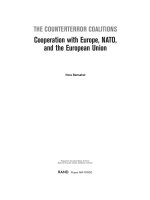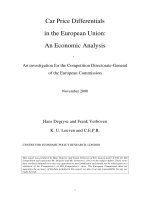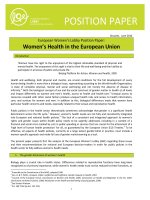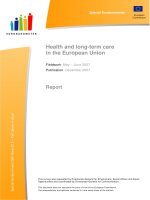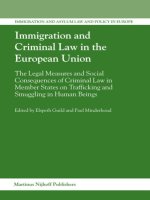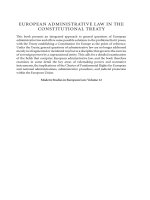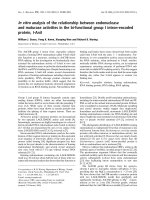IMMIGRATION AND CRIMINAL LAW IN THE EUROPEAN UNION doc
Bạn đang xem bản rút gọn của tài liệu. Xem và tải ngay bản đầy đủ của tài liệu tại đây (1.17 MB, 432 trang )
IMMIGRATION AND CRIMINAL LAW IN
THE EUROPEAN UNION
IMMIGRATION AND ASYLUM LAW AND POLICY IN EUROPE
Volume 9
Editors
Elspeth Guild
Kingsley Napley Solicitors, London,
Centre for Migration Law, Radboud University Nijmegen
Jan Niessen
Migration Policy Group, Brussels
The series is a venue for books on European immigration and asylum law and
policies where academics, policy makers, law practitioners and others look to
find detailed analysis of this dynamic field. Works in the series will start from
a European perspective. The incresed co-operation within the European Union
and the Council of Europe on matters related to immigration and asylum
requires the publication of theoretical and empirical research. The series will
contribute to well-informed policy debates by analysing and interpreting the
evolving European legislation and its effects on national law and policies. The
series brings together the various stakeholders in these policy debates: the legal
profession, researchers, employers, trade unions, human rights and other civil
society organisations.
The titles published in this series are listed at the end of this volume.
Immigration and Criminal Law in the
European Union:
The Legal Measures and Social Consequences of
Criminal Law in Member States on Trafficking
and Smuggling in Human Beings
Edited by
Elspeth Guild and Paul Minderhoud
Martinus Nijhoff Publishers
Leiden • Boston
A C.I.P. Catalogue record for this book is available from the Library of Congress.
Printed on acid-free paper.
ISBN 90 04 15064 1
© Copyright 2006 by Koninklijke Brill NV, Leiden, The Netherlands.
Koninklijke Brill NV incorporates the imprints Brill Academic Publishers, Martinus
Nijhoff Publishers and VSP.
All rights reserved. No part of this publication may be reproduced, stored in a retrieval
system, or transmitted in any form or by any means, electronic, mechanical, photocopy-
ing, microfilming, recording or otherwise, without written permission from the Pub-
lisher.
Authorization to photocopy items for internal or personal use is granted by Brill Aca-
demic Publishers provided that the appropriate fees are paid directly to The Copyright
Clearance Center, 222 Rosewood Drive, Suite 910, Danvers MA 01923, USA. Fees are
subject to change.
Printed and bound in The Netherlands.
The publication of this book was made possible by the financial support of the European
Commission Framework VI programme CHALLENGE.
TABLE OF CONTENTS
Immigration and Criminal Law in the European Union: The Legal
Measures and Social Consequences of Criminal Law in Member
States on Trafficking and Smuggling in Human Beings 1
Elspeth Guild
1 French Criminal and Administrative Law Concerning Smuggling of
Migrants and Trafficking in Human Beings: Punishing Trafficked
People for their Protection? 7
Johanne Vernier
2 Trafficking and Smuggling in France: Social Problems as
Transnational Security Issues 41
Virginie Guiraudon
3 The Legal Framework of Trafficking and Smuggling in Germany:
Victim Protection Emerging from Witness Protection? 69
Katja S. Ziegler
4 Social Working of Criminal Law on Trafficking and Smuggling in
Human Beings in Germany 113
Norbert Cyrus and Dita Vogel
5 Crimes of Assisting Illegal Immigration and Trafficking in Human
Beings in Italian Law: Illegal Immigration between Administrative
Infringement and Criminal Offence 141
Matilde Ventrella McCreight
6 Looking for Some Coherence: Migrants In-Between Criminalisation
and Protection in Italy 169
Raffaela Puggioni
vi
Table of Contents
7 Dutch Criminal and Administrative Law Concerning Trafficking in
and Smuggling of Human Beings. The Blurred Legal Position of
Smuggled and Trafficked Persons: Victims, Instigators or Illegals? 201
Bregje Pieters
8 Controlling Immigration and Organized Crime in the Netherlands.
Dutch Developments and Debates on Human Smuggling and
Trafficking 241
Richard Staring
9 I. Trafficking in and Smuggling of Human Beings: The Spanish
Approach 271
II. Main Issues on Spanish Alien Law and Practice Concerning
Trafficking and Smuggling of Human Beings 279
III. Main Issues in Spanish Criminal Law and Practice Related to
Trafficking in and Smuggling of Human Beings 298
C. Gortázar Rotaeche, E. García Coso and A. Obregón García
10 The Fight against Illegal Immigration, Smuggling and Trafficking in
Human Beings in Spain: Ambiguities and Rhetoric 325
Carmen González Enríquez
11 Trafficking and Smuggling in Human Beings: The British
Perspective 345
Dora Kostakopoulou
12 The Politics of Irregular Migration, Human Trafficking and People
Smuggling in the United Kingdom 371
Andrew Geddes
13 EU Action against Trafficking of Human Beings: Past, Present and
the Future 387
Tom Obokata
Conclusions: The Variable Political and Legal Geography of People
Smuggling and Trafficking in Europe 407
Elspeth Guild
List of Contributors 415
Index 421
Elspeth Guild
*
IMMIGRATION AND CRIMINAL LAW IN THE EUROPEAN UNION:
THE LEGAL MEASURES AND SOCIAL CONSEQUENCES OF
CRIMINAL LAW IN MEMBER STATES ON TRAFFICKING AND
SMUGGLING IN HUMAN BEINGS
1. INTRODUCTION
By 2003 an explosion in political, legislative and academic interest in the field of
trafficking and smuggling of human beings in Europe was well underway. It was
in part a reflection of the international concern regarding smuggling and traf-
ficking which was expressed in the United Nations Convention against Transna-
tional Organised Crime and two draft protocols, one to Prevent, Suppress and
Punish Trafficking in Persons, especially Women and Children and the other to
combating smuggling of persons which supplement the convention adopted in
2000. However, it also coincides with the opening of the EU common border
towards a number of countries, the new Member States, which in the recent past
had been considered countries of emigration towards the EU and in respect of
which concerns about organised crime and its involvement in people smuggling
and trafficking had been an important issue. The association of people smug-
gling and trafficking with prostitution and ‘slavery’ in a number of EU Member
States was particular strong, in fact existing legislation in a number of them
addressed the issue only from this perspective.
While a substantial literature was beginning to develop in the early years
of this century on the issue, much of it was instigated by a small number of
international organisations with specific interest, in particular the International
Organisation for Migration, academic studies into movement of persons and
their use of smugglers and traffickers were only beginning. One of the areas
where we noticed very little attention was the choice of fields of law into which
to insert this policy concern. While most policy concerns regarding border con-
trols are dealt with by way of administrative law, the UN measures recommend
* Professor of European Migration Law at the Radboud University, Nijmegen and
partner at the London law firm Kingsley Napley.
Elspeth Guild and Paul Minderhoud (eds.), Immigration and Criminal Law 1-6.
© 2006 Koninklijke Brill NV. Printed in the Netherlands. ISBN 90 04 15064 1.
2
Elspeth Guild
the use of criminal sanctions – an option increasingly adopted in this field by
EU states.
This is a study of the legal framework on criminal measures on trafficking
and/or smuggling and facilitating illegal entry in six Member States: France,
Germany, Italy, the Netherlands, Spain and the UK, and the European Union.
This issue is at the nexus of migration and criminal law. The system of criminal
law in the Member States is a central part of a complex and important part of
the balance of the powers of the authorities on the one side and the rights of the
citizen on the other. The way in which civil liberties of the individual are weighed
in comparison with public protection duties by the authorities is in essence a
constitutional issue. The treatment of foreigners, in particular as regards their
entry onto the territory and residence, is not part of the constitutional settle-
ments but a field which is governed by state discretion and exceptionalism. The
rules and administrative measures regarding entry, residence and expulsion of
foreigners is not subject to the same civil liberties guarantees of due process as
apply in criminal law.
In this comparative study we set out to examine, in each Member State, how
the insertion of immigration into criminal law takes place. Do the rules of crimi-
nal law in respect of due process take precedence over the lower evidential and
procedural requirements which are applied in the field of immigration? Is there
a trade off? How does the criminal justice system deal with this new field where
central constitutional issues are not present? There are two levels on which the
insertion of immigration into criminal law takes place – the legal and the social.
We recognised that it was necessary to examine both, on the one hand to look
at the laws and the court decisions on criminal trials in respect of immigrants
for immigration related offences,
1
on the other hand how the society (political
actors, media, interest groups etc) discuss and develop this issue. Our main con-
cern was to examine how the foreigner comes to be seen as a criminal and what
is the role of law in this process.
In developing this project, the European Union level will also be consid-
ered. Article 29 Treaty on European Union is concerned with achievement of a
high level of safety within an area of freedom, security and justice by developing
common action among the Member States in the fields of policy and judicial
cooperation in criminal matters specifically by preventing and combating crime,
including trafficking in persons. Thus this is a policy field which has been pushed
upwards in terms of level at which discussion and action is being pursued.
We contacted experts in law and social science in each of the countries
under consideration and invited them to participate in the study. The result is
two chapters per country, one chapter examining the legal framework of crimi-
nal law in respect of trafficking in human beings, illegal immigration as a crimi-
nal offence and the prosecutions which have taken place under this legislation;
1 We are focusing here on the meaning in national law.
3
Immigration and Criminal Law in the European Union
the second a consideration of the political and social debate on trafficking in
human beings and illegal immigration as a criminal offence specifically around
the use of criminal law in this field. This comparative work is central to under-
standing how the new EU legislation in the field can interact with the existing
framework of legislation. However, our starting place is the national level. Only
by understanding the issue at play at the national level can we begin to under-
stand the questions at the European level.
2. THE NATIONAL LAW ISSUES
Among the difficulties in this area of criminal law is identifying who is the
proper subject of criminal sanctions and who is a victim deserving of protec-
tion. The question of victims in criminal law is structured differently than in
respect of immigration law and the discussion developing on this field. A victim
is the person who suffers as a result of the action of another. In immigration, the
victim is defined as the person who gets the benefit of the action – i.e. entry into
the state. The same person who is one minute in immigration law constructed as
a victim of a trafficker may the next minute find herself the object of criminal
sanctions for irregular entry. As became clear in the debate in Greece on the
2003 law, if criminal law requires the immediate expulsion of persons irregularly
on the territory then there is unlikely to be any chance of a successful prosecu-
tion of the perpetrators of trafficking as those able to give evidence against them
will already be outside the jurisdiction of the tribunal. One of the many difficul-
ties in the field is the degree of complicity between the trafficker and the victim.
Culpability of one or other depends on the distinction which is made between
their respective responsibilities. The willingness of the authorities to grant pro-
tection to victims depends to a substantial degree on the extent to which those
authorities accept that the victims are indeed such and not accomplices of the
traffickers. Little is known about the comparative situation as regards this criti-
cal aspect of law in different Member States.
The intertwining of the issue of organised crime with immigration follows
much of the discussion at the political level. How is this reflected in national law
and the pursuit of alleged criminals? What happens at the trial stage? Another
field which has been traditionally joined with that of immigration in some
Member States is prostitution. The overlap in discussion about forced prosti-
tution and trafficking in women has become increasingly difficult to separate.
What is the role of the prostitute in the discussion at the civil and legal level?
The difference between smuggling and trafficking is unclear in many coun-
tries and indeed such a difference may not exist in some. We asked our par-
ticipants in each chapter to identify whether in law there is a difference in each
country and whether in the social discussion a difference is perceived as impor-
tant or relevant. Further after the attacks of 9 September 2001 in the USA and
11 March 2004 in Spain, the foreigner as a security threat has become part of the
4
Elspeth Guild
political and social debate on immigration and asylum. The security issue has
been very much dominated by the need to control people and their movement,
thus persons who move irregularly are more likely to be considered suspect than
others. However, persons who are in need of international protection, that is to
say refugees, will often be unable to travel regularly out of their country or into a
safe country where they apply for asylum. With the increasing use of mandatory
visa requirements and sanctions on carriers for transporting persons without the
necessary documents, refugees who may well not be able to get passports in their
country of origin without putting their lives in danger, let alone obtain visas to
travel to safe countries will mainly arrive irregularly. The limited provisions of
the UN Convention relating to the status of refugees 1951 and its 1967 protocol
which permit the exclusion of refugees who have committed particularly hei-
nous crimes have become a source of vivid discussion both at the national level
in EU states and at the EU level. The assumption is that there is some overlap
between the categories of refugee and terrorist. We asked our participants to
consider the impact of the anti terrorism debates in each of the countries and
the legal measures adopted as regards foreigners and in particular refugees and
to include this aspect of the discussion in their chapters.
3. THE EUROPEAN DEBATE
All too often when measures are attacked either in the national courts or, more
frequently, by public opinion as unfair or unjust, the national authorities point
to external actors. It is all too common for the target of disapproval to blame the
European institutions where there has been a co-ordination or harmonisation
of law which has resulted in what public opinion considers an unjust outcome.
When the European institutions are held out as responsible for the laws which
are under criticism depending on the information and measure which is available
to them, the criticisms can result in a loss of authority and legitimacy. It is very
important in the application of European Union law measures that challenges
to the legitimacy of the law do not result in a public reaction against the EU
as imposing unjust criminal laws. This issue is becoming even more important
at the EU level with the development of Europol, the creation of Eurojust and
the anticipated European Public Prosecutor. To the extent that this is a field of
trans-national crime within the scope foreseen for these bodies, their legitimacy
in the field will be extremely important to establish. However, where they are
acting in a highly contentious and complex field, they will be at risk of being
undermined from many sources and competing interests. Thus an understand-
ing of the sensitivities, the issues involved in some Member States (those most
acutely involved are the legal measures surrounding trafficking and illegal entry)
is timely.
5
Immigration and Criminal Law in the European Union
4. THE MAIN RESEARCH QUESTIONS
The two main issues which we have investigated are (a) the judicial and (b) politi-
cal legitimacy of laws at national level on trafficking/smuggling in persons. As
part of this study we have had regard to the judicial appreciation and social per-
ception of complicity between perpetrator and victim. The research questions
addressed the two fields as follows:
The issues from the legal perspective are:
1. What are the legal texts in force in the Member States under consideration
as regards trafficking and smuggling in persons, illegal and clandestine
entry;
2. The (main) criminal cases which have come before the courts under the
legislation over the preceding 5 year period;
3. The results of those cases in legal terms – conviction/acquittal; sentence;
4. The critical elements of evidence to the result.
The issues from the political perspective are:
1. The focus of public discussion regarding the question of trafficking and
smuggling in persons in the Member State over the past five years;
2. The main elements of the political debate on the passing of legislation on
trafficking in persons both in favour and opposed to the legislation;
3. The reaction of the press in the Member States under consideration to
the main criminal prosecutions for trafficking in persons over the past five
years;
4. The positions taken by civil society actors towards the issue of trafficking:
non-governmental organisations involved in immigration matters; lawyers’
associations; transport industry trade associations; political parties.
4.1 Methodology
The research has been carried out by a team of researchers in each Member
State under consideration. Each team consisted of two persons: a legal expert
and a political/social scientist. In each state the researchers had extensive knowl-
edge of the immigration law and policy of the Member State involved. The legal
researchers addressed the specific research questions relating to law including a
detailed review of the statutes/legal provisions and circulars relating to the area;
a review of the main court cases over the past five years relating to the field;
an analysis of the role of the victim both in the legislation and the court cases
including the relationship of the perpetrator and the victim; the rights of vic-
tims prior or following court judgments, in particularly when they have assisted
the police; an analysis of the legal texts to interpret the important elements; an
overview of what measures needed to be taken at the national level to integrate
the new EU acquis in the field.
6
Elspeth Guild
The social science researcher addressing the questions relating to policy and
legitimacy considered: the main press, both broadsheet and tabloid newspapers,
radio and television (where available) in the Member State on this issue; the par-
liamentary debates on legislation, circulars or other measures relating to traffick-
ing in human beings; the positions of non-governmental organisations including
women’s groups and victim support bodies, lawyers’ associations, trade bodies
and political parties about their positions on the legal provisions on traffick-
ing; the perceptions of officials responsible for bringing charges or investigating
potential or suspected offences of trafficking in human beings; the policy issues
which were considered relevant to trafficking legislation in the Member State;
the discussion regarding the engagement of “Europe” in the process and the
calls for and against EU level activity. The two researchers liaised closely and
worked together on their respective reports. The legal questions raised impor-
tant issues for the social scientist to pursue in his or her research and interviews
with actors. The chapter on the European Union considers the perspective of
the legislation alone.
The result of this research is now before you. Our book seeks to provide a
clear picture of the issues of legal and social legitimacy which surround crimi-
nal measures relating to trafficking in human beings in six Member States and
the EU. It explains the legal nature of the types of measures which have been
adopted and the presentation of criminal sanctions and the positions taken by
key actors in civil society. In our opinion, we have at least begun to address the
central issues of the intersection of administration law relating to foreigners and
criminal law and placed this intersection in its political and social context.
Johanne Vernier*
FRENCH CRIMINAL AND ADMINISTRATIVE LAW
CONCERNING SMUGGLING OF MIGRANTS AND
TRAFFICKING IN HUMAN BEINGS:
PUNISHING TRAFFICKED PEOPLE FOR THEIR PROTECTION?
1. INTRODUCTION
While the punishment of acts covered by the definition of smuggling of migrants
(“SM”) started in the 1970’s when the French frontiers were closed to labour
immigration, only in March 2001 did members of the French Parliament start
to deal with trafficking in human beings (“THB”) with the aim of protecting
human dignity. The French Act criminalising THB was thus drafted in 2003, at
the same time that international texts, i.e., UN and European texts, which are at
present the main references in THB, were being negotiated and adopted. I will
therefore analyse throughout this article the interactions between French and
international texts at the origin of the standards governing SM and THB.
National and international texts introduce SM and THB as two separate
offences, notably distinguished by the interests they protect and by the status
granted to smuggled and trafficked persons: while SM seems to be penalised to
protect the State’s interests by preventing illegal immigration in which the smug-
gled person willingly takes part, punishing THB aims at protecting the trafficked
person’s human rights. This difference between SM and THB implies that only
trafficked people can benefit from the status of victim. However, SM and THB
are closely linked, in theory as well as in practice, which can result in trafficked
persons who are aliens (third-country nationals) being treated as smuggled
migrants, not as victims of THB, and therfore being criminally sanctioned and/
or expelled from France instead of being protected. Under these circumstances,
* Doctoral candidate in Criminal Law at the Ecole doctorale de droit comparé, Uni-
versity of Panthéon-Sorbonne (Paris I), France, and a member of the association
Gisti (association providing support and information to migrants). This chapter
was translated by Christelle Nely.
Elspeth Guild and Paul Minderhoud (eds.), Immigration and Criminal Law 7-39.
© 2006 Koninklijke Brill NV. Printed in the Netherlands. ISBN 90 04 15064 1.
8
Johanne Vernier
is it possible to consider that victims, and more specifically victims of THB, have
rights as such?
2. HOW FRENCH LAW PUNISHES SMUGGLING OF MIGRANTS AND
TRAFFICKING IN HUMAN BEINGS
2.1 How Smuggling of Migrants is Punished
International Sources of French Law
The phrase “smuggling of migrants” was officially adopted in 2000 in the Pro-
tocol against the Smuggling of Migrants by Land, Sea and Air (SM Protocol),
supplementing the United Nations Convention against Transnational Organized
Crime (TOC Convention).
1
This Protocol gives the following definition for SM:
“the procurement, in order to obtain, directly or indirectly, financial or other
material benefit, of the illegal entry of a person into a State Party of which the
person is not a national or a permanent resident”.
2
It also covers the production
and provision of fraudulent travel or identity documents,
3
as well as the act of
enabling this person to remain illegally in the State concerned.
4
This protocol
also invites all Member States to increase the penalties for such offences when
committed under “circumstances that endanger, or are likely to endanger, the
lives or safety of migrants concerned” or “circumstances that entail inhuman or
degrading treatment, including for exploitation, of such migrants”.
5
France signed and ratified the SM Protocol in 2002,
6
then passed the Act
of 26 November 2003 on migration management, residence of aliens in France
and nationality,
7
thus modifying the legislation concerning aliens. First, penal-
ties were increased for carriers and, more generally, anyone who facilitates the
unauthorised entry, transit across and residence in France of an alien. Second,
the scope was increased: before this Act was passed, one could be punished for
facilitating the unauthorised entry, transit across and residence in France while
1 The TOC Convention and the SM Protocol were adopted by the General Assembly
of the United Nations on 15 November 2000 in Palermo. The TOC Convention
entered into force on 29 September 2003, and the SM Protocol entered into force on
28 January 2004.
2 SM Protocol Article 3 (a).
3 SM Protocol Article 6.1 (b) i) and ii).
4 SM Protocol Article 6.1 (c).
5 SM Protocol Article 6.3.
6 France signed the TOC Convention and the SM Protocol on 12 December 2000,
then ratified them on 29 October 2002 under the Acts No 2002-1039 and 2002-
1040 of 6.08.02, published in the Official Journal (OJ) No 183, 7.08.02, p. 13521
– 13522.
7 Act No 2003-1119, OJ 274, 27.11.03.
9
French Criminal and Administrative Law Concerning Smuggling of Migrants
acting from within another Member State of the 1990 Schengen Convention, or
for facilitating the unauthorised entry, transit across and residence in another
Schengen Convention Member State. Now, anyone who assists or tries to assist a
person to enter, transit across or reside in the territory of a SM Protocol Member
State, can also be punished.
The Reciprocal Influence of French Law and European Union Law
At the same time, France suggested – and obtained – that the EU Council adopt
the 28 November 2002 Directive defining the facilitation of unauthorised entry,
transit and residence
8
and the Council Framework Decision on the strengthen-
ing of the penal framework to prevent the facilitation of unauthorised entry,
transit and residence.
9
Only in exceptional circumstances may a State, rather
than the Commission, take legislative initiative regarding Community matters.
To respect the sovereignty of States in the field of immigration, the Treaty of
Amsterdam included a mechanism that left an important role for decision-
making to Member States for the first five years following 1 May 1999.
10
In addi-
tion, the EU Council was, during this time, the only decision-making body. This
is why the Council could, without the support of the European Parliament
11
(the
democratic representative body), adopt the text suggested by France rather than
the Commission’s note, which questioned the legal basis of the initiative.
12
Originally,
13
the suggestion from France was based on the French legisla-
tion governing SM and ignored the criteria of economic benefit, although this
criteria is required by Article 27 of the Schengen Convention. Consequently,
even people assisting aliens for disinterested motives could be punished, while
persons related to the assisted alien could not be punished.
14
The position of the
French government was that it was too difficult to prove the existence of profit,
8 Council Directive 2002/90/CE, OJ L 328, 5/12/02, p. 0017 – 0018.
9 Council Framework Decision 2002/946/JHA, OJ L 328, 5.12.02, p. 0001 – 0003.
10 See Aboudahab, Zouhair (2002) “Cadre juridique de la politique migratoire de
l’Union européenne: lecture critique”, in Le goût amer de nos fruits et légumes,
l’exploitation des migrants dans l’agriculture intensive en Europe, coll. Informations et
commentaires, Le développement en questions, ed. Forum civique européen et Asso-
ciation pour un nouveau développement, numéro hors série, March, pp. 53- 61.
11 The European Parliament rejected this proposal in its Opinion PE 300.204 on
15.02.2001, OJ C276, 1.10.2001, p. 244.
12 Note 8845/01 of 16.05.01.
13 Communication 9892/00 of 30 June 2000 from France with a view to the adoption
of a Framework Decision on the strengthening of the penal Framework to prevent
the facilitation of authorised entry and residence.
14 See Article 21.III. – (1) and (2), Ordinance No 5-2658 of 2.11.45 modified by the
Act of 26.11.03.
10
Johanne Vernier
which was an obstacle to effectively punishing such acts.
15
But the UN High
Commissioner for Refugees (UNHCR) recalled that it was necessary to protect
from sanctions victims of exploitation by certain criminal groups, as well as per-
sons (individuals or NGOs) assisting asylum seekers for disinterested motives.
16
This protection was all the more important to the UNHCR because the “States’
increasingly restrictive immigration policies” often left only one viable option for
genuine asylum seekers to reach the EU: smugglers. Finally, it was decided that
assisting an alien to reside illegally would only be criminalized where a pursuit
of gain exists, whereas the facilitation of unauthorised entry or transit would
be criminalized without this motive. Nevertheless, in the case of facilitation of
unauthorised transit and entry, all Member States must guarantee the right of
asylum, and have the possibility not to punish persons assisting an alien with
humanitarian motives. Here again, France modified its domestic law.
Strictly speaking, there is no offence called “smuggling of migrants” in
French law. However, the conduct is incriminated in a series of other, related
offences.
How the Facilitation of Unauthorised Entry, Transit or Residence, Is Punished
At present, the act of facilitating or attempting to facilitate, by assisting directly
or indirectly, the unauthorised entry, transit or residence of an alien is punish-
able by 5 years’ imprisonment and a fine of EUR30,000, to which can be added
the following additional penalties:
1. a 5-year (3 years before 2003) restraining order;
17
2. suspension of the driver’s licence for a maximum period of 5 years (3 years
before 2003);
3. temporary or definitive withdrawal of the administrative authorisation to
operate international transportation services;
4. confiscation of that which was used to commit the offence or which is the
product of it;
5. prohibition, for a maximum period of 5 years, to exercise any professional
or social activity which facilitated commission of the offence;
6. deportation without right of re-entry for 10 years.
18
15 See Council preparatory work of 28.07.2000.
16 See the Note 1235/00 of 16.10.00 from the UNHCR.
17 A restraining order prohibits the restrainee from being in a specific area determined
by the judge.
18 Article 21.II, Ordinance No 45-2658 of 2.11.45, modified by the Act of 26.11.03. A
banishment from the French territory involves a removal to the frontier without any
other condition.
11
French Criminal and Administrative Law Concerning Smuggling of Migrants
The maximum prison sentence is increased to 10 years and the maximum fine to
EUR 750,000 where such acts are committed by an organised gang
19
or under
circumstances involving an immediate risk of death or injuries which would
cause mutilation or permanent disability. The same penalties are applied where
the result of acts committed is to subject concerned aliens to living, transporta-
tion, working and harbouring conditions violating the dignity of persons, or to
separate minor aliens from their family or usual environment.
20
In this case, it is
possible to consider the confiscation of all or part of the smuggler’s property, as
well as the smuggler’s definitive deportation from France.
21
Nevertheless, some persons who merely help an alien reside illegally in
France are exempt from prosecution: ascendants, descendants, siblings and their
spouses, as well as the alien’s spouse or concubine (in France, this is a legally rec-
ognized non-marital partner). In addition, under the Act of 26 November 2003,
any individual or legal person providing assistance to an alien that is necessary
to ensure the safety of the alien’s life or physical safety, is also protected from
prosecution.
22
To avoid prosecution however, the person assisting an alien with
humanitarian motives must be confronted with a “present or imminent danger”,
where the means used are proportionate to the seriousness of the threat, and
without any direct or indirect benefit. According to various associations assist-
ing aliens, this restrictive definition of disinterested assistance does not suffi-
ciently call into question the underlying principle and results in punishing an
“offence of solidarity”.
23
Indeed, this provision does not add anything new, con-
19 Under the law, an organised gang is any group formed or association established
with a view to the preparation of one or more criminal offences, preparation
marked by one or more material actions. The penalties imposed on organised gangs
facilitating the unauthorised entry and residence in the Schengen area are generally
not superior to 3 years of prison. Considering this lack of severity, it would appear
that, contrary to the official national and international political opinion, “society”
is moving towards the decriminalisation of SM.
20 Article 21 bis I, Ordinance n°45-2658 of 2.11.45 modified by the Act of 26.11.03.
21 Article 21 bis II and III, Ordinance No 45-2658 of 2.11.45 modified by the Act of
26.11.03.
22 Article 21.III. – (3), Ordinance No 5-2658 of 2.11.45 modified by the Act of
26.11.03.
23 See the analysis of the Act of 26 November 2003, “Contrôler, surveiller et punir”,
12/2003, 4th edition, by the GISTI (Groupe d’Information et de Soutien des Immi-
grés), available on the website <www.gisti.org>. The same site provides a petition
that denounces the punishment of an “offence of solidarity” and information on the
criminal proceedings against members of associations for having assisted undocu-
mented people.
12
Johanne Vernier
sidering that it is based on the standard defence to liability found in the French
Penal Code: necessity.
24
The Particular Case of Carriers
In 1992,
25
the Administration began to fine carriers who transport aliens who do
not possess the documents necessary to enter the Schengen area, per Article 26
of the Schengen Convention.
In 2003, France implemented the Council Directive of 28 June 2001 sup-
plementing Article 26 of the Schengen Convention:
26
the fine was increased from
EUR 1,500 to EUR 5,000 for every alien disembarking or transiting in France.
This fine is reduced to EUR 3,000 where the transportation company concerned
systematically provides the passengers’ travel documents and visas to the border
control authorities. Where the alien transported is a minor travelling without
a legal representative, the transportation company must immediately deposit
EUR 5,000 or EUR 3,000, which will be partially or entirely returned, depend-
ing on the amount of the fine eventually assessed. Where no deposit is made, the
fine is increased to EUR 10,000 or EUR 6,000. When the alien is authorised to
enter France to lodge a request for asylum that is not “manifestly unfounded”,
the transportation company is not punished.
27
But the consequence of increas-
ing the carriers’ liability may be that the carriers will be less and less willing to
take the risk of taking “bogus” asylum seekers on board – especially when they
are minors – which would further reduce the opportunities for aliens to apply
for asylum in France.
28
The Particular Case of the Marriage of Convenience
The act of contracting or organising a marriage only for the purpose of gaining
a residence permit for the alien is now
29
punishable by 5 years’ imprisonment
and a fine of EUR 15,000, or 10 years and EUR 750,000 where the acts were
24 See Article 122-7 of the French Penal Code: “a person is not criminally liable if con-
fronted with a present or imminent danger to himself, another person or property,
he performs an act necessary to ensure the safety of the person or property, except
where the means used are disproportionate to the seriousness of the threat”.
25 Act No 92-625 of 6.07.92, OJ 158, 9.07.92.
26 Directive 2001/51/CE of 28.06.01, OJ L 187, 10.07.01.
27 Article 20 bis II. – 2°, Ordinance No 45-2658 of 2.11.45 modified by the Act of
26.11.03.
28 See analysis of the Act of 26 November 2003, “Contrôler, surveiller et punir”,
December 2003, 4th edition, by the GISTI (Groupe d’Information et de Soutien des
Immigrés), available on the website <www.gisti.org>.
29 Under the Act of 26.11.03 mentioned above.
13
French Criminal and Administrative Law Concerning Smuggling of Migrants
committed by an organised gang.
30
The additional penalties described above (see
How the facilitation of unauthorised entry, transit or residence, is punished,
numbers 1, 5 and 6), as well as the confiscation of all or part of the couple’s
property, may also be imposed. Incriminating this particular form of marriage
of convenience as a separate offence appears to be redundant in the light of the
existing offence of facilitating unauthorised residence, as well as disproportion-
ate in comparison to other motives which are not penalised.
31
How Forgery and the Use of Forgeries Are Punished
The list provided by the French Penal Code of offences undermining public
trust includes forgery and the use of forgeries committed in a document deliv-
ered by a public body for the purpose of establishing a right, an identity or a
capacity, or to grant an authorisation.
32
This includes, for instance, the forgery
of a passport, an ID card or a residence permit. The maximum penalty of 5
years’ imprisonment and fine of EUR 75,000 are increased to 7 years and EUR
100,000 where the offence is committed by a person holding public authority, or
where it is committed habitually or with the intent to facilitate the commission
of a felony.
Criminal and administrative law thus interact to punish offences relating to
SM: although prison sentences cannot be imposed under administrative law, it
can accelerate the repressive response to the acts concerned by avoiding a pre-
liminary judgment.
How Migrants Who Benefit from the Assistance Are Punished
In the SM Protocol, migrants who benefit from assistance are presented as the
“subjects” of smuggling, and cannot be punished as such. However, the Protocol
specifies that a migrant’s conduct can lead the State concerned to take measures
against him,
33
including detention.
34
Indeed, French law provides for the punishment of assisted migrants,
although not on the grounds of smuggling, but for acts which are closely linked
to smuggling:
– where the migrant illegally enters, transits across or resides in France, he/
she can be criminally and administratively punished. On the one hand, the
30 New Article 21 quater, Ordinance No 45-2658 of 2.11.45 modified by the Act of
26.11.03.
31 See analysis of the Act of 26 November 2003, “Contrôler, surveiller et punir”,
December 2003, 4th edition, by the GISTI (Groupe d’Information et de Soutien des
Immigrés), available on the website <www.gisti.org>.
32 Article 441-2 of the French Penal Code.
33 See Article 6. 4 of the SM Protocol.
34 The hypothesis of detention is specified in Article 16. 5 entitled “Protection and
assistance measures”!
14
Johanne Vernier
criminal judge can impose a maximum prison sentence of 1 year, a maxi-
mum fine of EUR 3,750 and automatic deportation with no right of re-entry
for 3 years.
35
On the other hand, the Prefect (the local State representative)
can impose the administrative detention of the migrant during the period
required to organise the migrant’s departure (32 days maximum).
– where the migrant contracts marriage solely for the purpose of gaining a
residence permit, he/she is subject to the same penalties as those applicable
to the marriage of convenience;
– where the migrant possesses a forged document, he/she is punishable by
2 years’ imprisonment and a fine of EUR 30,000, and up to 5 years and
EUR 75,000 where he/she possesses several forged documents.
36
In this context, can we say that an assisted migrant is the victim of the acts con-
stituting smuggling of migrants?
In the SM Protocol, the word “victim” appears only once, as if by accident,
in Article 15 on preventive measures. Nowhere else in the text does the assisted
migrant benefit from the status of victim. Rather, he/she is considered an alien
who voluntarily benefits from the SM by illegally entering and/or residing in the
territory of a Member State.
The migrant thus appears in both the Protocol and French law as the main
perpetrator of the SM, and the smuggler his or her accomplice. Indeed, French
law defines an accomplice as a person who knowingly, by aiding and abetting,
facilitates the preparation or commission of an offence. This clearly describes
the conduct of the smuggler, though if the migrant is considered to provoke the
SM, she or he becomes the smuggler’s accomplice under another definition.
37
This conception of the migrant as perpetrator or provocateur may explain why
the smuggled alien who is arrested along with the smugglers tends to be pun-
ished more severely than the smugglers.
38
The true victim of the SM would in fact appear to be the State,
39
harmed in
its sovereignty, in the integrity of its territory. Considering the offences addressed
35 Article 19, Ordinance No 45-2658 of 2.11.45 modified by the Act of 26.11.03.
36 Article 441-3 of the French Penal Code.
37 Article 121-7 of the French Penal Code also defines the accomplice as any person
who, by means of a gift, promise, threat, order, or an abuse of authority or powers,
provokes the commission of an offence or gives instructions to commit it.
38 For instance, the Tribunal de grande instance de Paris (Paris District Court), sec-
tion 16/1, sentenced on 24.09.03 an alien who was helped to enter France illegally
to 4 months’ imprisonment and expulsion from France for 2 years, while the two
smugglers were sentenced to 15 and 18 months’ imprisonment, respectively, were
expulsed from France for 3 years.
39 It is specified in the Preamble of the SM Protocol that organised criminal groups
“bring great harm to the States concerned”.
15
French Criminal and Administrative Law Concerning Smuggling of Migrants
by French law, the punishment of SM aims, a priori, at fighting against illegal
immigration and protecting public trust. Consequently, strictly speaking, the
migrant is not a victim of SM, but only of the violations of his/her rights result-
ing from the SM (endangerment or exploitation).
40
The punishment of illegal
immigration, considered to be criminogenic and progressively acquiring the
status of transnational organised crime, is currently a priority for France as well
as for EU.
41
2.2 How Trafficking in Human Beings Is Punished
International Sources of French Law
The international definition of THB is provided by the Protocol to Prevent, Sup-
press and Punish Trafficking in Persons, Especially Women and Children (TP Pro-
tocol),
42
supplementing the United Nations TOC Convention, as well as by the
EU Council Framework Decision of 19 July 2002 on combating trafficking in
human beings.
43
The acts constituting THB cannot be penalised in and of them-
selves; only the means used and the purpose of such acts make them punishable.
The Framework Decision, which brought minor alterations to the TP Protocol,
44
provides a list of the acts concerned: the recruitment, transportation, transfer,
harbouring, subsequent reception of a person, including exchange or transfer
of control over that person. It also lists the means used for trafficking: coercion,
force or threat, including abduction, deceit or fraud, abuse of authority or of a
position of vulnerability, which is such that the person has no real and accept-
able alternative but to submit to the abuse involved, or payments or benefits are
given or received to achieve the consent of a person having control over another
person. However, where the victim is a minor, such acts shall be considered traf-
ficking in human beings, even if this does not involve any of the means men-
tioned above. Finally, the purpose of the perpetrator must be the exploitation of
40 The Preamble of the SM Protocol recalls the necessity to strengthen international
cooperation “in order to address the root causes of migration”. Migrations them-
selves therefore constitute a greater problem than their conditions, but the fact that
these conditions can violate the migrants’ rights helps to fight against migrations, in
the name of the protection of such migrants.
41 According to the first recitals of the Directive and of the Framework Decision on
the facilitation of unauthorised entry, transit and residence, one of the objectives
of the European Union is to combat the aiding of illegal immigration to provide
citizens with an area of freedom, security and justice.
42 The TP Protocol entered into force on 25 December 2003.
43 Framework Decision 2002/629/JHA, OJ L 203, 1.08.02, p. 0001 – 0004.
44 The European Commission wanted to be more exhaustive in completing the UN
text, but France, inter alia, opposed this suggestion. The definitions provided by
these texts are actually very close to each other.
16
Johanne Vernier
the trafficked person. It can be either the “exploitation of that person’s labour
or services, including at least forced or compulsory labour or services, slavery or
practices similar to slavery or servitude”, or the “exploitation of the prostitution
of others or other forms of sexual exploitation, including in pornography.” Con-
sidering this definition, the trafficker is the one who facilitates the commission
of the exploitation. The trafficker is therefore the exploiter’s accomplice.
A specific offence of THB has recently been introduced in French law with
the Law on internal security (Loi sur la sécurité intérieure, LSI) of 18 March
2003.
45
The idea to create this offence first came up in 2001 when a Parliament
information mission, created on the initiative of field associations,
46
concluded
that it was necessary.
47
The decision to incriminate “trafficking in human beings”
was then mainly inspired by the TP Protocol. Soon afterwards, a parliamentary
bill on the fight against contemporary slavery (proposition de loi relative à la lutte
contre l’esclavage aujourd’hui) was introduced. But this bill was considered of
minor interest and was not passed into law.
48
In 2003, however, the incrimination
of human trafficking was finally adopted. But, where the 2002 parliamentary bill
was mainly aimed at protecting trafficked persons’ dignity, the objective of the
2003 law was to strengthen the fight against pimping and to guarantee French
citizens’ right to security, which became a fundamental right in 1995.
49
However,
parliamentary debates resulted in a more generic definition of THB rather than
restricting it to pimping.
How Trafficking in Human Beings Is Punished
Under the new Article 225-4-1 of the French Penal Code, THB is a violation
of human dignity. It is defined as the recruitment, transport, transfer, accom-
modation, or reception of a person in exchange for remuneration or any other
benefit or for the promise of remuneration or any other benefit, in order to put
him/her at the disposal of a third party, whether identified or not, so as to permit
45 Act No 2003-239, OJ No 66, 19.03.03, p.4761, available on the Website <www.legi-
france.gouv.fr>.
46 For instance, the CCEM (Comité contre l’esclavage moderne – Committee against
modern slavery).
47 Information report entitled L’esclavage, en France, aujourd’hui (Slavery in France,
today) No 3459, registered at the National Assembly on 12.12.01, available on the
website www.assemblee-nationale.fr.
48 This text, which was approved by the lower chamber on 24 January 2002 but was
never reviewed by the upper chamber, is available on the website <www.assemblee-
nationale.fr>.
49 See Act of 21.01.95. This principle was then reaffirmed under the Law on everyday
security of 15.11.01 (Loi sur la sécurité quotidienne, LSQ), the Orientation and pro-
gramming Law for internal security (loi d’orientation et de programmation pour la
sécurité intérieure) of 29.08.02 and under the Law on internal security of 18.03.03.
17
French Criminal and Administrative Law Concerning Smuggling of Migrants
the commission against that person of offences of pimping, sexual assault or
attack, exploitation of begging, or the imposition of living or working condi-
tions inconsistent with human dignity, or to force this person to commit any
felony or misdemeanour. THB is punishable by a prison sentence of up to 7
years and a fine of up to EUR 150,000. This sentence is increased to 10 years
where, inter alia:
– the offence was committed in respect of a minor, of a particularly vulner-
able person,
50
of several persons or of a person who was outside France, or
upon arrival in France;
– the trafficked person was placed in circumstances involving an immediate
risk of death or injuries which would cause mutilation or permanent dis-
ability;
– the offence was committed with the use of constraint, violence or fraudu-
lent behaviour aimed at the trafficked person, a member of his/her family,
or a person habitually in contact with the trafficked person;
– the perpetrator of the offence is an ascendant of the trafficked person or a
person holding authority over him/her or who misuses the authority con-
ferred by his functions.
The maximum prison sentence and fine are then increased to 20 years and
EUR 3,000,000 where the offence was committed by an organised gang, and
to life imprisonment and EUR 4,500,000 where torture or acts of barbarity are
used. Where the victim is a minor, the statute of limitations for public prosecu-
tion runs from the date at which the victim ceases to be a minor, instead of the
day of commission of the crime. Prosecution in felony cases (a crime carrying
a prison sentence of at least 10 years) is time-barred by the passing of 10 years
from the day of the commission of the crime (3 years for a misdemeanour).
Although the French definition seems quite similar to that of international
texts, there are significant differences. The first concerns the acts incriminated:
in the French law, the exchange or transfer of control over the trafficked person
is a purpose, not a means. The second difference concerns the means: those
described in the Framework Decision are not elements of the basic offence, but
only constitute aggravating circumstances. Finally, concerning the purpose, in
the French law the trafficker does not commit the offence with a view to the
exploitation of the trafficked person, but with a view to handing this person over
to a third party to obtain financial or other material benefit. The trafficker does
not need to have knowledge of the possible exploitation of the trafficked person
to be punished, but where this knowledge exists, the sentence will be similar to
50 The particular vulnerability of a person is due to age, sickness, to a disability, a
psychic or physical deficiency or to a state of pregnancy, and must be apparent or
known to the offender.
18
Johanne Vernier
that of the exploiter.
51
Consequently, the French THB offence covers not only
acts of complicity in the exploitation, as in the international definition, but also
other autonomous acts that consist in handing the trafficked person over for
financial or other material benefit, whether this person is willing or not.
It should be noted that, even where the trafficked person voluntarily takes
part in the THB, this person remains a victim of the THB, and the trafficker
remains guilty: firstly, the means used to achieve the consent are aggravating fac-
tors, not elements constituting the crime of THB, and secondly, the consent of
the victim is not a defence to liability for the perpetrator. The victim’s consent is
therefore only taken into account to determine the severity of the punishment.
How Exploitation Is Punished
In 2003, the exploitation of trafficked persons falls within the definitions of a
series of common-law crimes listed in Article 225-4-1 of the French Penal Code.
On the basis of the EU definition of THB, these offences can be classified in two
categories: sexual exploitation and exploitation of the labour or services.
Sexual exploitation
The French definition of pimping is extremely broad, since both constraint
pimping (proxénétisme de contrainte) and support pimping (proxénétisme de
soutien) are punished.
Constraint pimping consists in: hiring, leading a person into or corrupting
a person in view of prostitution, or exercising pressure on such a person to make
her/him practice prostitution or continue doing so, or making a profit out of the
prostitution of someone, sharing the products or receiving habitually income
from a prostituted person. The sentence to which the pimp is liable is increased
under the following circumstances: where the victim is a minor or is particu-
larly vulnerable, where an abuse of authority exists, where a weapon was used
to threaten, where constraint, violence or fraudulent behaviour was used, where
torture or acts of barbarity were used. The punishment of exploitation-prostitu-
tion thus visibly aims at protecting personal liberties, such as the right to respect
of the will or physical integrity, in the name of respect of human dignity.
51 Article 225-4-5 of the French Penal Code. It should be noted that, in cases that
occurred before 18 March 2003, aiding the exploitation of prostitution tended to
be less severely punished than the exploitation itself, although both acts had the
same legal qualification (pimping). For instance, in a sentence by the Tribunal de
grande instance de Paris (Paris District Court), section 16/1, on 21.10.03, the person
who had exploited the prostitution of young women was sentenced to 8 years of
imprisonment, a fine of EUR50,000 and a definitive banishment from the French
territory, while the person who had purchased, accommodated, dressed and handed
the persons to prostitute over to the exploiter to obtain a payment, was sentenced
to 5 years of imprisonment, a fine of EUR30,000 and a definitive banishment from
the French territory.


